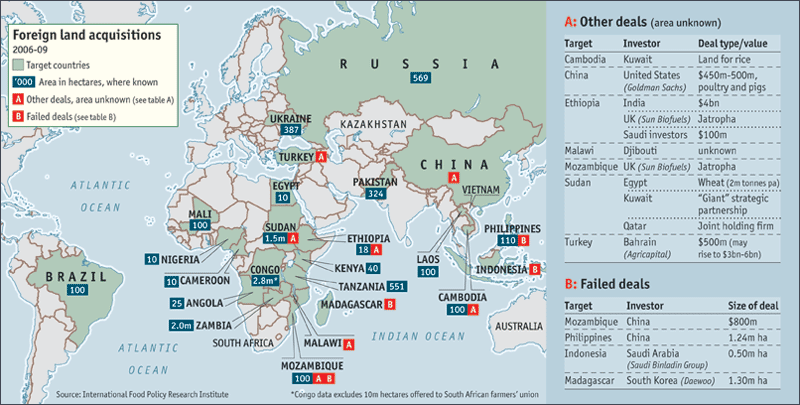In my post Food and Water Shortages in the Middle East, I cited an article that reported “several oil-rich nations, including Saudi Arabia, have started searching for farmland in fertile but politically unstable countries like Pakistan and Sudan, with the goal of growing crops to be shipped home.” I cautioned that such a strategy was risky. “In times of shortage,” I wrote, “it may prove difficult to get food out of countries like Pakistan even if it has been bought and paid for.” In a more recent post [Time Magazine’s Small World], I focused on a Time Magazine section that discussed ideas that the magazine believes are changing the world “right now.” The seventh idea on the list was about countries like Saudi Arabia buying farmland in other countries. Below is how I addressed the idea in that post.
“The Rent-A-Country” [Krista Mahr] — Rent-a-country sounds a lot like neo-colonialism — so why is it a world changing idea? The epithet may be flippant, but the idea is profound. The concept is not about exploitation, but symbiosis. It grew out of last year’s food crisis. “Countries like Saudi Arabia, Kuwait, Qatar and South Korea — well-off states without enough good land or water to feed their people — started to look outside their borders.” … The concept is not without controversy. Food security is an important issue for every single individual on the planet. In times of shortage, people are wary about having foreigners owning local land and crops. Mahr concludes: ‘In countries where governments can’t afford — or don’t prioritize — significant domestic agricultural investment, foreign money has the power to deliver better roads, irrigation, technology and training. “One thousand times we say yes on private and public agricultural investment, but done in a certain way,” says Jean-Philippe Audinet, acting director of the policy division at the U.N.’s International Fund for Agricultural Development. “It’s very important not to look negatively at this trend. We have to try to look at the win-win.” After all, is there a choice? Some of these deals are probably doomed to fall under the ax of the global credit crunch, if they haven’t already. But for land-poor countries, the underlying problem of relying heavily on imports will remain. Encouraging a new generation of deals to come out of the diplomatic closet may be the best chance we have to make sure that people on both ends of the bargain end up with food on their plate.'”
Despite the UN’s plea “not to look negatively at this trend,” The Economist asserts that countries should “be wary of the results” [“Cornering foreign fields,” 23 May 2009 print issue]. How could one magazine see the issue as a positive development and the other see it as a negative one? Below is how The Economist describes what is happening.
“Over the past two years, as much as 20m hectares of farmland—an area as big as France’s sprawling farmland and worth $20 billion-30 billion—has been quietly handed over to capital-exporting countries such as Saudi Arabia, Kuwait and China. They buy or lease millions of acres, grow staple crops or biofuels on it, and ship them home. The countries doing the selling are some of the world’s poorest and least stable ones: Sudan, Ethiopia, Congo, Pakistan. Usually, when foreigners show up in these places, it is with aid, pity and lectures (or, in one instance, arrest warrants for war crimes). It must make a nice change to find their farms, so often sources of failure and famine, objects of commercial interest instead. Yet while governments celebrate these investments, the rest of the world might reasonably ask why, if the deals are so good, one of the biggest of them helped cause the overthrow of the government that signed it—the one in Madagascar. Will this new scramble for Africa and Asia really reduce malnutrition, as its supporters say? Or are critics right that these are ‘land grabs’, ‘neocolonialist’ rip-offs, different from 19th-century colonialism only because they involve different land-grabbers and enrich different local elites?”
Those are certainly legitimate questions. If proponents of agricultural public/private partnerships can’t answer them, the world has a right to be skeptical. But I agree with the assertion of the UN’s Jean-Philippe Audinet, we should be looking for win-win scenarios. Even The Economist agrees that “it would be graceless to write off in advance foreign investment in some of the most miserable places on earth.” The magazine even agrees that there are tremendous up sides if win-win scenarios can be found.
“The potential benefits of new seeds, drip-feed irrigation and farm credit are vast. Most other things seem to have failed African agriculture—domestic investment, foreign aid, international loans—so it is worth trying something new. Bear in mind, too, that worldwide economic efficiency will rise if (as is happening) Saudi Arabia abandons mind-bogglingly expensive wheat farms in the desert and buys up land in east Africa.”
Still, the magazine admits to a nagging unease about the deals — primarily because most of the deals are shrouded in secrecy. A lack of transparency is generally a warning sign of corruption and poor governance. When I present the Enterra Solutions® Development-in-a-Box™ framework to leaders of developing nations, I stress that sustainable development requires openness and transparency. As The Economist notes, “Secrecy makes it impossible to know whether farms are really getting more efficient or whether the deals are done mainly to line politicians’ pockets.” Another concern the magazine has is that many of the deals are not public/private partnerships but government-to-government deals.
“This raises awkward questions. Foreign investment helps countries not only by applying new technology but also by reorganising the way people work and by keeping an eye on costs. Few governments do this well, corrupt ones least of all. One of the biggest problems of large-scale commercial farming in poor countries is that well-connected farmers find it more profitable to seek special favours than to farm. These deals may exacerbate that problem. Worse, the impetus for many of them has not been profit-seeking by those who want to turn around failing farms. Rather, it has been alarm at rising food prices and export bans. Protectionism, not efficiency, has been the driving force. It would be better to liberalise food markets and boost trade than encourage further land grabs.”
The final concern expressed by the magazine is that the current round of deals is being made at greatly discounted prices.
“There are serious doubts about whether countries acquiring land are paying the true cost of it. Host governments usually claim the farmland they offer is vacant, state-owned property. That is often untrue. It may well support smallholders who have farmed it for generations. They have no title, only customary rights. Deals that push them off their land or override customary rights cannot be justified. International bodies, such as the African Union, are drawing up codes of conduct to limit such abuses. They are sorely needed.”
If the international community wants to help the poor, the article asserts, it should push for “freer trade and stronger property rights.” Despite all of its concerns, The Economist concludes there is some room for optimism. “If the deals eventually raised yields, spread technology and created jobs,” it says, “that would at least be some cause for celebration.” In an accompanying article [“Outsourcing’s third wave“], The Economist goes into detail about where land is being acquired and by whom. The attached image accompanies that story.
This latter article concludes that the only way to achieve a win-win scenario is to adopt an enforceable code of conduct.
“Joachim von Braun, the head of IFPRI [International Food Policy Research Institute], argues that the best way to resolve the conflicts and create ‘a win-win’ is for foreign investors to sign a code of conduct to improve the terms of the deals for locals. Various international bodies have been working on their versions of such a code, including the African Union, which is due to ratify one at a summit in July. Good practice would mean respecting customary rights; sharing benefits among locals (ie, not just bringing in your own workers), increasing transparency (current deals are shrouded in secrecy) and abiding by national trade policies (which means not exporting if the host country is suffering a famine). These sound well and good. But Sudan and Ethiopia have famines now: should they be declining to sign land deals altogether? Many of the worst abuses are committed by the foreign investors’ local partners: will they be restrained by some international code? There are plenty of reasons for scepticism about these deals. If they manage to reverse the long decline of farming in poor countries, they will have justified themselves. But like any big farming venture, they will take years to reveal their full impact. For the moment, the right response is to defer judgment and keep a watchful, hopeful but wary eye on their progress.”
Exploitation is never sustainable. Rich, but agriculturally challenged, countries need a sustainable solution to their food security challenges. Poor countries need foreign direct investment to help them achieve sustainable development. Working to find a win-win solution that benefits people in both countries is the only ethical and sustainable course to follow.





